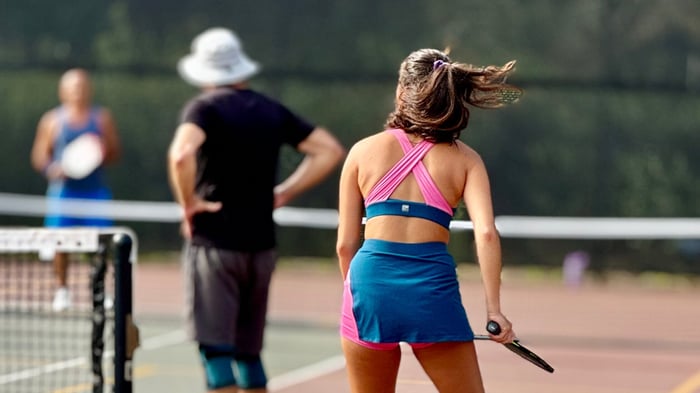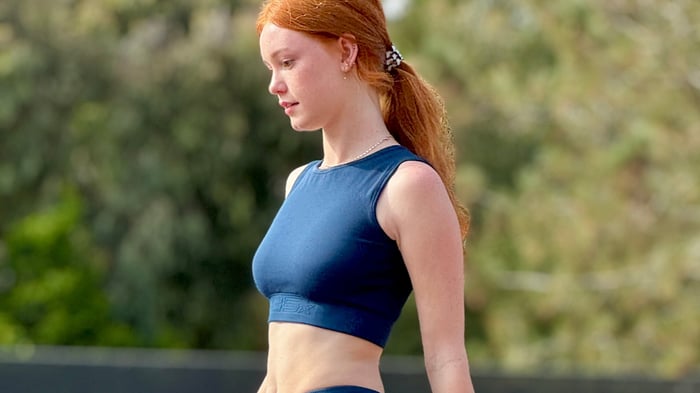Key takeaways:
Good nutrition doesn’t just help you feel better—it shows up in your energy, your focus, and how fast you bounce back after matches.
When you eat matters just as much as what you eat. Starting your day with a solid breakfast and timing your meals before matches can help you stay stronger, longer.
Keeping your energy steady with quick snacks and staying on top of hydration between points makes a big difference.
Pickleball takes more out of you than just quick footwork and fast hands. It pushes your stamina, your focus, and your ability to bounce back when the matches start adding up. Staying strong through those long rallies—and feeling ready to do it again the next day—comes down to more than just practice. It comes down to how you fuel.
What you do off the court matters just as much as what you do on it. Smart nutrition, good hydration, and gear that keeps you cool and moving—like the lightweight pickleball wear from PB5star—can make a real difference when the games get tough.
Why nutrition matters for your game
Pickleball takes more out of you than you realize, especially once the points get longer and the matches stack up. Those quick bursts to the kitchen line, the sudden stops, the scrappy rallies that seem to last forever and they all drain your energy faster than you think. If you’re not fueling right, it shows. You lose a step. Your focus slips. That third match of the day feels a whole lot harder than it should.
That's where smart nutrition comes in. What you eat and drink before, during, and after you play helps you:
Keep your energy steady so you’re not dragging by your second or third match
Stay clear-headed and sharp when points get fast and messy
Bounce back faster between games and between days, instead of feeling wiped out
You don’t have to be chasing tournament trophies to feel the difference. Better fuel makes every match more fun and keeps you playing strong, from start to finish.
What to eat on tournament day
Tournament days stretch longer than you think. Early matches, unexpected breaks, overtime battles—they all take a toll. A simple, flexible eating plan can make the difference between finishing strong and fading out.
Here's a game-day menu that keeps you powered up:
The night before:
Dinner: Grilled salmon, brown rice, and roasted broccoli
Why it matters: Complex carbs refill energy stores, protein helps muscles recover, and lighter, clean foods won't leave you sluggish the next morning.
Tournament morning (2–3 hours before first match):
Breakfast: Oatmeal with almond butter and banana slices, or whole-grain toast with scrambled eggs and avocado
Why it matters: Balanced carbs and protein to give you steady, long-lasting energy without weighing you down.
Between matches:
Smart snacks:
Banana with almond butter
Trail mix (nuts + dried fruit)
Whole-grain crackers and string cheese
Why it matters: Quick-digesting, portable snacks that keep you fueled without spiking blood sugar. Easy to pack in your PB5star tournament bag.
Midday lunch (if still competing):
Lunch: Turkey and hummus wrap with spinach, plus orange slices
Why it matters: Moderate, easy-to-digest meal that recharges energy without making you sluggish.
Post-tournament recovery (within 30–45 minutes):
Recovery foods: Greek yogurt with berries, a protein smoothie, or a PB&J sandwich
Why it matters: Protein and carbs start muscle repair and restore energy levels, setting you up for faster recovery and stronger play tomorrow.
Planning your meals gives you one less thing to worry about on match day—and one more thing working in your favor when games get tough.
How to manage energy and recovery
Eating a solid breakfast and packing the right snacks sets you up for a good start—but what you do between matches matters just as much. Small adjustments to when and what you eat during the day can keep your energy level steady, help you stay sharp longer, and make recovery a whole lot easier once the games are done.
Here’s how to keep your body fueled and ready while you're competing:
The night before:
Dinner: Grilled salmon, brown rice, and roasted broccoli
Why it matters: Complex carbs refill your energy stores, protein helps muscles recover, and lighter foods leave you feeling ready, not weighed down.
Tournament morning (2–3 hours before your first match):
Breakfast: Oatmeal with almond butter and banana slices, or whole-grain toast with scrambled eggs and avocado
Why it matters: A good mix of carbs and protein gives you long-lasting energy without slowing you down when it’s time to move.
Between matches:
Smart snacks:
Banana with almond butter
Whole-grain crackers with string cheese
Why it matters: Quick, portable snacks top off your energy without crashing your blood sugar.
Midday lunch (if you're still competing):
Lunch: Turkey and hummus wrap with spinach, plus a handful of orange slices
Why it matters: A balanced, easy-to-digest meal that recharges your tank without making you feel sluggish during afternoon matches.
Post-tournament recovery (within 30–45 minutes):
Recovery foods: Greek yogurt with berries, a protein smoothie, or a peanut butter and jelly sandwich on whole-grain bread
Why it matters: Protein and carbs help repair muscles and restock energy stores, giving you a faster, stronger recovery for tomorrow.
Planning your food and dialing in your overall tournament prep can make a big difference.
Micronutrients that support performance
When people talk about sports nutrition, they usually focus on the big stuff—carbs for energy, protein for muscle repair, healthy fats for endurance. And that’s important. But the smaller nutrients you get from fruits, vegetables, and whole foods are what help everything run the way it should.
Without enough of the right vitamins and minerals, you might start to feel sluggish sooner, struggle with cramps, or take longer to recover between matches.
Here are a few micronutrients that matter more than most for pickleball players:
Magnesium and potassium: Help your muscles fire properly and keep cramps at bay, especially during long tournament days when you’re sweating more than usual.
Vitamin C and zinc: Give your immune system a boost, which is key when you're pushing your body hard and recovering overnight.
Iron: Helps carry oxygen through your blood to your muscles—essential for staying strong through those long rallies and back-to-back games.
A colorful plate of fruits, vegetables, lean proteins, and whole grains gives your body everything it needs to stay strong and recover faster.
Paying attention to these smaller details isn’t about overhauling your entire diet. It’s about making sure your body has the tools it needs to play hard, bounce back, and keep feeling good match after match.
How to adjust for different conditions
Where you play can be just as important as how you play. Different conditions drain your energy in different ways, and small adjustments to your nutrition can help you stay strong no matter what the day throws at you.
If you're playing in the heat:
You can't wait until you're already sweating to start thinking about hydration. Getting ahead of it is key.
Hydrate early. Start drinking water steadily a few hours before your first match.
Eat water-rich foods. Cucumbers, melon, oranges, and smoothies help keep you topped off.
Add electrolytes. If you're playing for more than an hour, swap in an electrolyte drink to replace minerals you’re sweating out.
If you're indoors or playing in cooler weather:
Just because you're not drenched doesn’t mean your body isn't working hard.
Keep sipping water. Even inside, steady hydration keeps your energy up.
Focus on warming foods. Meals like oatmeal, rice bowls, and roasted veggies help maintain energy without feeling heavy.
A few smart adjustments can help you play stronger and recover faster, no matter the setting.
Signs your nutrition plan is working
Good nutrition should show up in more ways than just feeling a little less tired. If you’re eating and hydrating well, you’ll notice where it really matters—how you move, how you focus, and how you bounce back after long matches.
Here’s what to watch for:
Energy that lasts: You can stay strong through third games and late rounds, instead of hitting a wall halfway through the day.
Faster recovery: You wake up ready to move the next morning, not feeling like you’re stuck in slow motion.
Clearer focus: Your reactions stay sharp, even when matches drag on and fatigue starts creeping in.
Nutrition isn’t the only thing that affects how you feel out there. Sleep, training, stress, even a little tournament pressure—they all add up. But when you’re fueling well, it’s one less thing weighing you down, and everything else gets a little easier to handle.
You don’t need charts or trackers (but those can help, too) to figure it out. Pay attention to how you feel on the court—and how you feel getting up for the next match.
Eat smart, play stronger
The way you eat, hydrate, and recover won’t change everything overnight. But it does make a difference—especially when the games get longer, the days get hotter, and the small things start to matter more.
Some days you'll get it right. Other days, it might take a little more effort. That’s part of playing the long game. If you stay consistent with the basics, you’ll feel it—more energy in tough matches, faster recovery after long days, and stronger play when it matters.
And when you’re heading into those matches with performance gear from PB5star, you’ll be ready to bring out your A-game.







